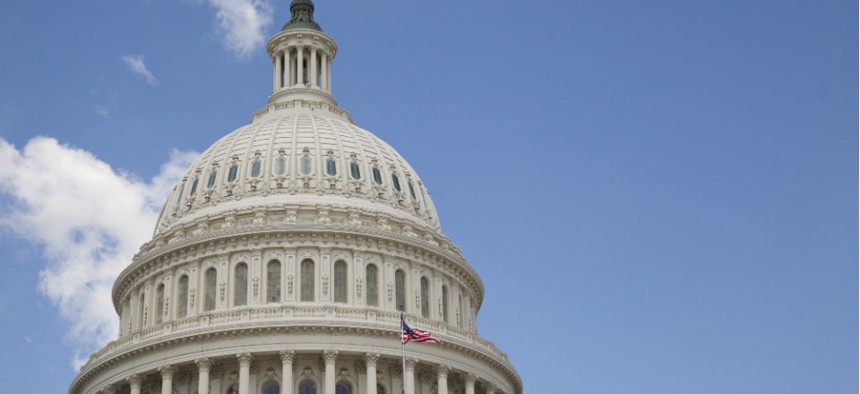
njene / Shutterstock.com
The Senate's Scattershot Approach to Ferguson
Lawmakers are pursuing a subcommittee hearing, a bill, and review of a Defense program, but nothing is expected to pass when senators return in September.
Even before Attorney General Eric Holder and the Justice Department have wrapped up their investigation into the lethal shooting of Michael Brown in Ferguson, Mo., some senators are planning a legislative response for when Congress returns next month.
No single measure has so far emerged as a consensus legislation, and it's unclear whether Majority Leader Harry Reid intends to introduce anything in the Senate. A spokesman for Reid did not comment.
But, in a sign that the emotions and outcry around Ferguson will carry into September, some lawmakers have already begun announcing their plans.
On Thursday, Democratic Sen. Claire McCaskill of Missouri said she will convene a Financial and Contracting Oversight Subcommittee hearing in September to "examine federal programs that enable local police departments to acquire military equipment," according to a statement from her office.
That particular issue has grabbed headlines since Brown's fatal shooting by a Ferguson police officer and during the ensuing protests, when officers deployed what many described as militarized equipment, including tear gas and rubber bullets.
In a show of just how high-profile Ferguson and police response have become, Sen. Rand Paul of Kentucky, a potential 2016 presidential contender, even penned an op-ed in Time under the headline "We Must Demilitarize the Police."
McCaskill plans to invite various stakeholders to the hearing, according to the statement, with more details expected soon.
Still, a bill dealing with police militarization seems unlikely to make it to the Senate floor. In an interview with a Nevada television station this week, Reid sounded supportive of the use of military equipment in police departments nationwide.
"The issue is this: Whether we should allow surplus equipment the military has to go to police departments. I say yes," Reid said on the show Nevada Newsmakers. "We have police departments all over the country, including those in Nevada, who are desperate for more resources. And the mere fact that you have the equipment doesn't mean that you have to use it."
Despite Reid's position, Armed Services Committee Chairman Carl Levin of Michigan promised a review of the law that allows the Pentagon to sell its equipment to police departments.
"We intended this equipment to keep police officers and their communities safe from heavily armed drug gangs and terrorist incidents," Levin said in a statement. "Before the defense authorization bill comes to the Senate floor, we will review this program to determine if equipment provided by the Defense Department is being used as intended."
It is a potentially crucial point, since both chambers of Congress and members of both parties assume the defense authorization will be passed before the end of the year.
Meanwhile, independent Sen. Bernie Sanders of Vermont linked the shooting with youth unemployment and he plans to introduce legislation on that front. His proposal would include $4 billion to the Labor Department for grants aimed at setting up summer and year-round job opportunities for poor youth. His bill would also include $1.5 billion for competitive grants to local communities for work-based training, according to a letter Sanders sent to his colleagues.
"If we are going to reduce youth violence and instill hope and a bright future for the young people in this country, we have got to provide them with the jobs and the skills they need to pay for a college education to and to move up the economic ladder," Sanders wrote.







